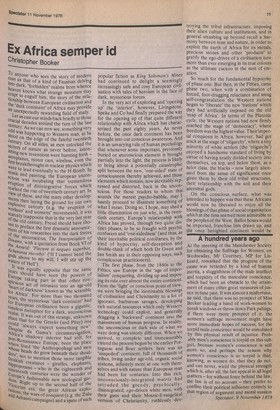Ex Africa semper id
Christopher Booker
To anyone who sees the story of modern man as that of a kind of Faustian delving into dark, 'forbidden' realms from whence heaven knows what strange monsters may erupt to engulf him, the story of the relationship between European civilisation and the 'dark continent' of Africa may provide an unexpectedly rewarding field of study. Let us cast our minds back briefly to those crucial decades around the turn of the last century. As we can now see, something very odd was happening to Western man, as he stood on the edge of the fateful twentieth century. On all sides, as men unlocked the secrets of nature as never before, astonishing new inventions were bursting forth — aeroplanes, motor cars, wireless, even the first breakthroughs in nuclear physics which Were to lead eventually to the H-Bomb. In Music and painting, the European unconscious was incubating that tremendous eruption of disintegrative forces which Marked the rise of twentieth century art. In view of these, and the many other devel°PMents then laying the ground for our own eXplosive century (e.g. the eruption of workers, and womens' movements), it was scarcely inapposite that in the very last year Of the old century, Freud should have chosen to preface the first dramatic announcement of his researches into the dark forces of the unconscious, The Interpretation of the with a quotation from Book VI of Aeneid: Tlectere Si nequeo superbos, Acheronta movebo' ('If I cannot bend the gods above to my will, I will stir up the Waters of Hell'). It was equally apposite that the same years should have seen the powers of Europe taking part in that other consSicuous act of intrusion into an age-old pea of darkness' known as 'the scramble for Africa'. For more than two thousand Years, the mysterious 'dark continent' had .Or European civilisation been a !aim. It was out of this strange, unknown gigantic, realm metaphor for a dark, unconscious Place that for the Greeks (and Pliny) or could 'always expect something new „es.Pite da Gama's circumnavigation, ritrica's shadowy interior had still, for riohst-kenaissance Europe, been the place Where lived 'the Anthropophagi and men ,whose heads do grow beneath their shoulders' not to mention those more tangible freakish creatures — giraffes, elephants, „PP°Potami — who in the eighteenth and nineteenth centuries were the wonder of , th,uroPe's fashionable new zoological garj.tis. Right up to the second half of the Ctoria.n era, the great African explo:pons, the wars of conquest (e.g. the Zulu andAshanti c am paigns) and a spate of such popular fiction as King Solomon's Mines had continued to delight a seemingly increasingly safe and cosy European civilisation with tales of heroism in the face of dark, mysterious forces. In the very act of exploring and 'opening up' the 'interior', however, Livingstone, Speke and Co had finally prepared the way for the opening up of that quite different relationship with Africa which has characterised the past eighty years. As never before, the once dark continent has been brought into our conscious awareness. And it is an unvarying rule of human psychology that whenever some important, previously buried or unconscious element is brought partially into the light, the process is likely to bring about a potentially catastrophic split between the new, 'one-sided' state of consciousness thereby achieved, and those elements which remain, now inevitably repressed and distorted, back in the unconscious. For those readers to whom this sounds the merest psycho-babble, may I hastily proceed to illustrate something of what I mean. Doing so, I hope, may shed a little illumination on just why, in the twentieth century, Europe's relationship with Africa has proved, through two quite distinct phases, to be so fraught with psychic confusion and 'one-sidedness' (and thus, as their inevitable political corollaries, by the kind of hypocrisy, self-deception and double-think of which both Dr Owen and Ian Smith are in their opposing ways, such conspicuous practitioners). The first phase, from the 1880s to the Fifties, saw Europe in the 'age of imperialism' conquering, dividing up and imposing its rule over almost the entire continent. From the 'light' or conscious point of view, we were bringing the inestimable blessings of civilisation and Christianity to a lot. of ignorant, barbarous savages, developing rich natural resources which only Western technology could exploit, and generally dragging a 'backward' continent into the mainstream of human progress. In reality, the unconscious or dark side of what we were doing was utterly different. When we arrived, to complete and immeasurably extend the process begun by the earlier Portuguese and Boer settlers, here was an 'unspoiled' continent, full of thousands of tribes, living under age-old, organic social systems, infinitely more at one with themselves and with nature than European man had been for centuries. Into this rich, unconsciously-integrated matrix had intruded the greedy, psychically disintegrated, ego-driven white men, with their guns and their Mosaic-Evangelical version of Christianity, ruthlessly des toying the tribal infrastructure, imposing their alien culture and institutions, and in general smashing up beyond recall a harmony between man and nature, in order to exploit the earth of Africa for its metals, precious stones and other 'products' to gratify the ego-drives of a civilisation now more than ever emerging in its true colours as the ultimate cuckoo in the nest of creation.
So much for the fundamental hypocrisy of phase one. But then, in the Fifties, came phase two, when with a combination of forced, foot-dragging reluctance and smug self-congratulation the Western nations began to 'liberate' the new 'nations' which they had artificially imposed on the old 'map of Africa'. In terms of the Platonic cycle, the Western nations had now firmly reached the stage of 'democracy', where freedom was the highest value. Their imperial conquests in Africa, however, had got stuck at the stage of 'oligarchy', where a tiny minority of white settlers (the 'oligarchs') enjoyed a handsome standard of living by virtue of having neatly divided society into themselves, on top, and below them, as a helot class, the blacks — now largely alienated from the sense of significance once given them by their old tribal structures, their relationship with the soil and their ancestral gods.
On the conscious surface, what was intended to happen was that these Africans would now be liberated to enjoy all the blessings of that phase of social organisation which at the time seemed most admirable to the peoples of the West. Ballot boxes would be imported, franchise lists drawn up, and the once benighted continent would be filled with agreeable little replicas of the home-grown European democracies, in full working order. Oh blessed self-deception! Once again, beneath the surface, the reality was quite different. For, as the independence movement gathered way, the African peoples had already, to a greater or lesser extent, been turned by the process of alienation not into a heterogeneous collection of autonomous little potential democrats, but into a mass, defined simply by their external characteristic of being black as opposed to white. Their old tribal loyalties had largely ceased to be something life-giving, providing meaning to their lives, but had turned into something potentially destructive, a mere external badge of division. They had in short begun to develop (despite the many striking and admirable individuals thrown up in all parts of Africa) the collective characteristics of a rootless proletariat, with new loyalties centred on the independence movement or 'Party'. Psychologically, the moment of winning independence thus became very similar to that moment of 'revolution', when the 'People' finally overthrow the old order and take control — no longer a heterogeneous, organic people, so much as a mass following that supreme expression of the collectivised or group ego, a charismatic leader.
The first well-known example of this phenomenon was Kwame Nkrumah of the old Gold Coast. Full of revolutionary rhetoric and talk of 'the People', he swiftly took the new state of Ghana along that only too familiar road to 'tyranny'. The whole point about the 'tyrant' (as opposed to the old 'monarch', or his more shadowy later manifestations as 'constitutional monarch', or 'democratic president') is that he is no longer subject to a belief that he is the symbolic cornerstone of an infinitely subtle framework, relating his society to the patterns of nature and ancestral wisdom. He is simply (like Stalin or Mussolini) a great bull frog, puffed up by the collectivised ego of his people, inflated by the conviction that this glorious new society is all a function of his own will (as Nkrumah put it 'I am the Redeemer'). And of course all over Africa we have seen the same process repeated countless times since, from Equatorial Guinea to the Empire of Bokassa I, from Mobutu's Congo to Amin's Uganda.
Despite all the lessons of the past twenty years, we still see Dr Owen cavorting about under the impression that 'one man, one vote' means something other than just the fact that, sooner or later, there will only be one man left in the country whose vote earries any weight —the tyrant. When Dr Owen uses that phrase 'majority rule', meaning a 'black majority', he is still of course thinking of 'majority' as it is defined in the liberaldemocratic phase of the Platonic cycle preponderance of free, autonomous ow zens. In practice, however, in Africa just as in many other parts of the world, it all tee often comes to mean simply that tyranny off the 'People', the demos, over the mass:0' actual people — a deadly abstraction which may be used to cloak and to sanctify everY kind of atrocity and 'civil wrong' practised by a part against the whole (and in rilanY parts of Africa this has been given a new twist, as the members of one tribe have, the name of the 'whole', been able to t)nran: nise over the rest, through the control 0' i the party or state apparatus). The most interesting thing of all is that' because of the stage of political develor ment the world in general has today reached, it has now become virtuallY, impossible to defend the 'oligarchic order of the old white-settler domination — anY more than it would have been possible to, freeze Britain's development at its stage ni aristocratic, landowner domination, again!' the rising tide of parliamentary reform, uln' versa1 suffrage and welfare egalitarianign; That is why Ian Smith is on the way out, and why the white South Africans (am" ,3 bloodbath which could equal that of the 1917 Bolshevik Revolution and its after" math) are eventually likely to follow. . We need no longer be under any Hi loos as to where this tide leads. It has nothing Tr do with 'democracy'. Nor does it ultimate') have anything to do with allowing 'the blacks to run their own show' —except in the sense that the 1917 Revolution allowed the Russian peasants and workers to run thetr own show. It is no accident that the Oct white race apparently able to operate mos. freely in large parts of Africa are the gull sians, because having been through the flu cycle themselves, they are entirely at WO: if not with Africans, at least with the `tyrall, state'. They therefore have no difficulty deploying the hypocritical term inologY ° that final phase of Europe's relationshIP with Africa, which allows the setting up 011 new kind of imperalism in the name 19e 'anti-imperialism', just as it permits °if imposition of new, much worse forms oppression in the name of 'popular 11"r eration'. When we see, staring-eyed ort television screens, the faces of men in`r Nkomo, Kaunda or Amin, we may wondee at these new freaks and monsters who ball emerged from the 'dark continent' — Inner as our eighteenth-century ancestors yelled at those cameleopards and rnieag horses of old. But let us not forget wb°, unconsciously, summoned these new In° sters into being. Poor us. Even more, Pn° Africa.



































 Previous page
Previous page